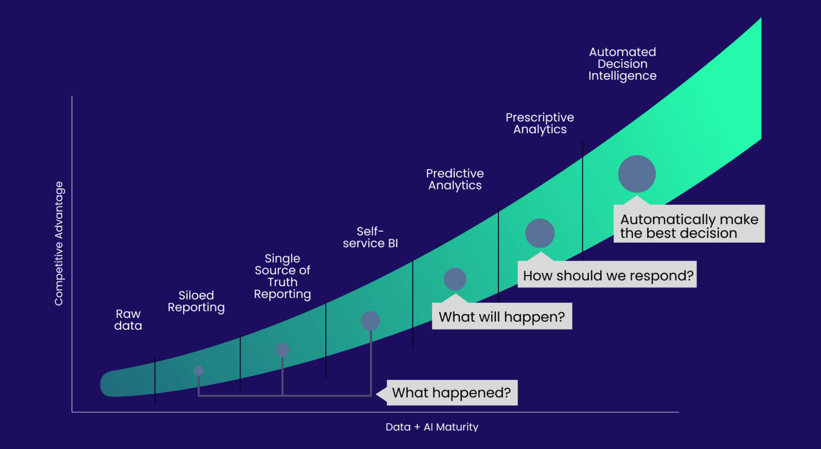In today’s highly competitive retail industry, the role of data in shaping decisions and strategies cannot be overstated. Businesses are aware of the need to use their data effectively, but making this happen can be challenging. To tap into the full potential of their data, they must first ensure it’s reliable and consistent.
This is where data warehouses come into play. But what exactly is a data warehouse, and how could one benefit your business? In this article, we’ll demystify data warehouses, delve into how they operate, and show how they enable retail businesses to make better business decisions.
The role of data in retail
In the digital age, businesses generate and collect vast amounts of data. This data can come from various sources, such as (but by no means limited to) customer transactions, website interactions, and social media.

Analysing this data provides valuable insights into customer behaviour, market trends, and operational efficiency. To stay competitive and relevant, retail companies must use this data to inform their business decisions.
To do so, many will turn to a Business Intelligence (BI) tool. However, without laying the right foundations, this strategy can be flawed. While BI tools can connect to raw data sources, they cannot take into account all the information from various departments needed to make more accurate and better decisions. This is because they fail to create or show insights based on a Single Source of Truth.
The importance of a Single Source of Truth
In data analytics, a Single Source of Truth refers to a unified, reliable, and consistent version of data used for decision-making. Without one, organisations may struggle with disparate data sources, inconsistent data formats, and data quality issues—leading to confusion and errors.
The solution? A data warehouse.
What is a data warehouse?
A data warehouse aggregates large amounts of data from multiple sources. In other words, it stores data from places like a business’s Customer Relationship Management (CRM), an ERP, social media platforms, and more, bringing it all together in one place and preparing it for analysis.
Unlike traditional transactional databases designed for day-to-day operations, data warehouses are optimised for analytical purposes. They store data in a structured and easily accessible format, making it ideal for business intelligence and data analytics.

This centralised approach ensures that data is consistently structured and organised, making it easier to analyse and draw meaningful insights. Data warehouses also support complex queries and reporting.
How does a data warehouse organise your data?
In a data warehouse, an ‘intermediate transforming layer’ breaks down each constituent element of your business (e.g. customers or specific processes) into fundamental components known as ‘entities’. These entities make it easier for you to interpret your data.
Let’s take the example of a customer entity. Customers interact with multiple data systems at different points of their journey. A BI tool may be able to pull each of these in separately and allow reporting on top. But, if you want to scale with your data and access a Single Source of Truth, you need to ensure that the various systems have a way of reconciling against each other.
A customer ‘entity’ in the data warehouse creates a bridge between all of your systems and the different concepts of a ‘customer’. This allows you to ask questions to any of your datasets and be confident that the representation is always the same.
The key to advancing your data maturity
Implementing a data warehouse is an essential step for businesses looking to improve how they harness their data—or, in other words, increase their ‘data maturity’.
Data maturity is all about how well a company leverages data for decision-making. It encompasses an organisation’s data-related capabilities and practices, ranging from how they collect and store data to how those insights are used strategically.
Think of data maturity as a curve.

On the left, companies tend to look backwards—analysing historical data, often in a less structured and reliable way. Reporting is siloed between departments, and the data used is inconsistent, making it hard to draw any helpful insight.
The further right a company is, the more proactive, trustworthy, and automated systems it has in place to use data in fundamental decision-making. The pinnacle of data maturity is decision intelligence, where an organisation’s data systems can make confident decisions and act autonomously without human intervention.
Find out where you are on the data maturity curve.
Retail businesses further up the curve reap many benefits, such as more effective marketing campaigns and cost-efficient supply chains. After all, a study by McKinsey shows that data-savvy companies are 23 times more likely to outperform competitors in customer acquisition. They’re also 19 times more likely to stay profitable and seven times more likely to retain customers.
However, none of this is possible without a Single Source of Truth. Implementing a data warehouse is imperative for businesses that want to progress past the early stages.
Turning data into decisions in retail
It’s clear that data holds a real significance in the world of retail. But to harness its full potential, businesses need a structured approach to ensure their data is stored, collected and analysed effectively. In other words, build a Single Source of Truth.
To help you progress along your data journey, we’ve written an eBook.
In it, we’ll help you identify where you’re at in your data journey and provide actionable steps to elevate your company’s data capabilities at each stage. We’ll also share tips about how to manage this transition effectively.
By embracing these insights, you’ll be empowered to make more informed decisions and propel your retail business to the next level of data maturity.
Don’t miss out; download your free copy today.



